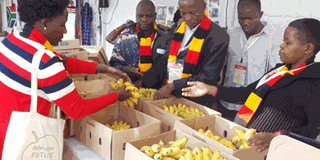Ugandan food crops showcased at Italy show

The Ugandan stall during Terra Madre expo in Turin, Italy. On show were indigenous food crops and methods of preparing them. PHOTO BY MICHAEL J SALI
What you need to know:
- Slow Food International President and Founder, Carlos Petrini, described Africa as a vibrant continent that holds the future of agriculture.
- The coffee stall marketed what is branded there as Caffe’ Robusta di Luwero (Robusta Coffee from Luwero).
A coffee farmer, Ronald Mubiru, head of the Luweero Kisansa Robusta Coffee Presidium, sold packs of roasted coffee at €9 each
More than 7,000 farmers from 143 countries were in the Italian city of Turin, September 21-27 for an international exhibition—Terra Madre Salone del Gusto—organised by Slow Food International.
They displayed their cultural foods as well as how the crops and animal products are prepared.
Uganda, as one of the participating nations, is gifted with a wide variety of food crops. But many of them are little known and face extinction due to a shift by farmers to grow crops that are more demanded by traders seeking satisfy foreign markets.
For instance, by promoting the “rolex chapatti”, we encourage the farmers to grow more wheat, which originated from foreign lands.
Yet we are gifted with indigenous food crops, edible insects, fish species, local mushrooms, and some animals and herbs that would give a visitor an idea about the Ugandan cuisine.
Harriet Birabwa Ssali from Mukono and Alice Betty Nakato from Kyengera led the team that cooked katogo of matooke and byenda (mix of banana and offals) and luwombo (mix of dried fish and groundnut stew) at the show.
They sold 1,000 plates at €10 each, which fetched the equivalent of Shs3.7m in a single day.
Uganda is famous for its Ankole long horn. Joyce Kabiti from Mubende explained to the show goers that it is raised for both milk and meat. She answered questions about the kyanzi—a wooden container in which milk is kept.
She also talked about how the Banyankole make ghee, amakano(kind of yoghurt), and blood meal from the cow.
The coffee stall marketed what is branded there as Caffe’ Robusta di Luwero (Robusta Coffee from Luwero).
A coffee farmer, Ronald Mubiru, head of the Luweero Kisansa Robusta Coffee Presidium, sold packs of roasted coffee at €9 each.
The Kisansa variety of Robusta coffee, mainly grown in Luweero, is one of the traditional coffee varieties in Uganda that needs to be safeguarded from extinction.
The coffee is on high demand in Italy. At the Terra Madre, many show goers also had a chance to taste a cup of it.
Mubiru also made a presentation about the history of Kisansa coffee.
In this, he mentioned the cultural aspect of coffee in Uganda. The steamed and dried cherries have stimulating properties and are often chewed as well as shared among friends as a means of cementing friendship, marriage and brotherhood.
Umaru Kityo, a farmer from Bukunja in Mukono District, displayed climbing yams locally known as balugu.
He explained how it is cultivate, how it is cooked and the best sauce to eat it with.
Beatrice Ndagano, a member of Slow Food Greater Masaka Ndiizi Presidium, showcased ndiizi bananas as well as crisps made from the sweet banana.
Tom Kasajja, a farmer from Kayunga District, spoke about Kayinja banana variety as a source of banana juice and wine. He also highlighted the disease challenges that the crop is currently facing.
Eddie Mukiibi, the Slow Food International vice president, pointed out that Uganda had a rich biodiversity of bananas but due to Banana Bacterial Wilt, Ugandan scientists are applying remedial methods that are likely to end up with just a single banana variety.
Later, he addressed delegates from Africa and appealed to them to promote agricultural biodiversity by growing indigenous food crops using indigenous knowledge.
“Africa has a wide range of climates and environments that encourage the flourishing of diverse forms of crops and animals through difficult times,” he said.
Slow Food International President and Founder, Carlos Petrini, described Africa as a vibrant continent that holds the future of agriculture.
“Africa must be supported in this effort and we don’t need to donate but rather to return what was taken,” he said.
There was also a march through the streets of Turin under the theme: “They are giants but we are millions.”
Slow Food International is focused on protection of smallholder farmers against land grabbing and exploitation by large corporations and commercial agriculture investors.
Prior to the march, Sergio Mattarella the Italian President, addressed the Terra Madre delegates and encouraged them to stand together to sustain the production of “clean, fair, and good food”.


